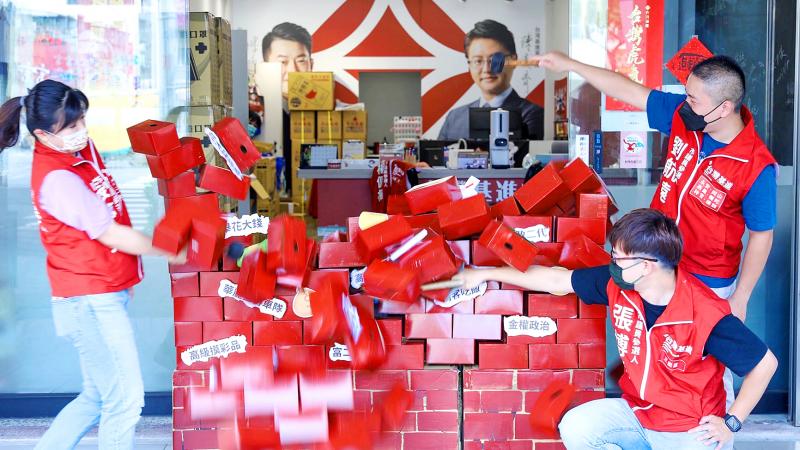The Taiwan Statebuilding Party on Thursday called for an end to “big money politics” and suggested limits on campaign spending for city and county councilor candidates in November’s local elections.
“We ask the government to enforce regulations to end ‘black gold’ influence in elections,” party official Chang Po-yang (張博洋) said at an event in Kaohsiung.
“Black gold” refers to the monetary influence of organized crime.

Photo: Wang Jung-hsiang, Taipei Times
For November’s city and county councilor elections, the party recommends a campaign spending cap of NT$3 million (US$101,163), Chang said, adding that parties should rely on idealistic young people and other volunteers to spread their messages.
Without spending constraints, Taiwanese politics is destined to become the exclusive domain of corporations, wealthy people, family dynasties and candidates with ties to organized crime, he said.
Media reported in 2018 that successful city council campaigns spent a minimum of NT$15 million, former party chief financial officer Chang Ting-ting (張婷婷) said.
“We even heard that one candidate for Kaohsiung City council in 2018 had spent NT$80 million,” she said. “That is an outrageous figure. A person could buy a luxury mansion in Taiwan for that money.”
Party executives and candidates at the event built a mock brick wall of cardboard and paper, with “bricks” displaying expensive campaign items such as promotions, television advertising, billboards, banquets, campaign trucks and brochure printing costs.
Party members took turns hammering bricks off the wall to represent knocking expensive items off of campaigns.
Wealthy people and powerful interests regularly spend more than NT$20 million to help a candidate win a seat, Chang Po-yang said, adding that councilors become more interested in helping donors recoup their “investment” rather than following up on promises.
“Big money” campaign funding has led to well-known scandals regarding office-assistant expenditures, and charges of fraud, bid-rigging and public-project embezzlement, he said.

Taiwan has received more than US$70 million in royalties as of the end of last year from developing the F-16V jet as countries worldwide purchase or upgrade to this popular model, government and military officials said on Saturday. Taiwan funded the development of the F-16V jet and ended up the sole investor as other countries withdrew from the program. Now the F-16V is increasingly popular and countries must pay Taiwan a percentage in royalties when they purchase new F-16V aircraft or upgrade older F-16 models. The next five years are expected to be the peak for these royalties, with Taiwan potentially earning

STAY IN YOUR LANE: As the US and Israel attack Iran, the ministry has warned China not to overstep by including Taiwanese citizens in its evacuation orders The Ministry of Foreign Affairs (MOFA) yesterday rebuked a statement by China’s embassy in Israel that it would evacuate Taiwanese holders of Chinese travel documents from Israel amid the latter’s escalating conflict with Iran. Tensions have risen across the Middle East in the wake of US and Israeli airstrikes on Iran beginning Saturday. China subsequently issued an evacuation notice for its citizens. In a news release, the Chinese embassy in Israel said holders of “Taiwan compatriot permits (台胞證)” issued to Taiwanese nationals by Chinese authorities for travel to China — could register for evacuation to Egypt. In Taipei, the ministry yesterday said Taiwan

Taiwan is awaiting official notification from the US regarding the status of the Agreement on Reciprocal Trade (ART) after the US Supreme Court ruled US President Donald Trump's global tariffs unconstitutional. Speaking to reporters before a legislative hearing today, Premier Cho Jung-tai (卓榮泰) said that Taiwan's negotiation team remains focused on ensuring that the bilateral trade deal remains intact despite the legal challenge to Trump's tariff policy. "The US has pledged to notify its trade partners once the subsequent administrative and legal processes are finalized, and that certainly includes Taiwan," Cho said when asked about opposition parties’ doubts that the ART was

If China chose to invade Taiwan tomorrow, it would only have to sever three undersea fiber-optic cable clusters to cause a data blackout, Jason Hsu (許毓仁), a senior fellow at the Hudson Institute and former Chinese Nationalist Party (KMT) legislator, told a US security panel yesterday. In a Taiwan contingency, cable disruption would be one of the earliest preinvasion actions and the signal that escalation had begun, he said, adding that Taiwan’s current cable repair capabilities are insufficient. The US-China Economic and Security Review Commission (USCC) yesterday held a hearing on US-China Competition Under the Sea, with Hsu speaking on